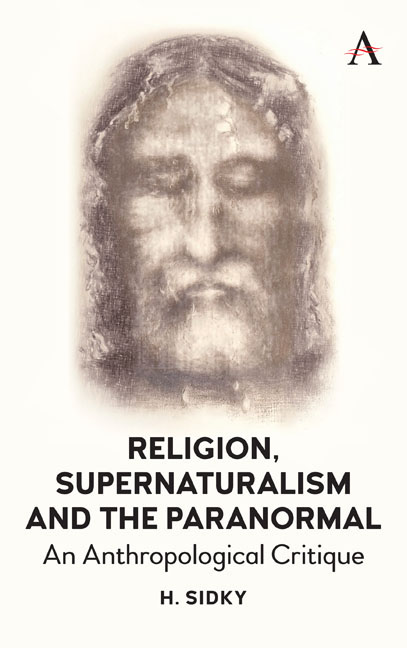Book contents
- Frontmatter
- Dedication
- Contents
- Acknowledgments
- Introduction
- Chapter One The Problem with Religion: Preliminary Issues
- Chapter Two The Unreal Real: The Supernatural, Religion, and the Paranormal
- Chapter Three Can Science Say Anything About Religion and the Supernatural?
- Chapter Four Ghostly Rappings, the Science of the Soul, and the Religious Nature of the Paranormal
- Chapter Five Ghostly Encounters in the Field: Anthropology of the Paranormal or Paranormal Anthropology?
- Chapter Six Why We Think the World Is Haunted
- Chapter Seven Cognitive Biases and Why People Think Eerie Thoughts
- Chapter Eight Miracles as Evidence of God's Actions in the World
- Chapter Nine When God Talks to People: Are Religious Experience Evidence of God?
- Chapter Ten Books Authored by God? Sacred Texts as Evidence of the Supernatural
- Chapter Eleven God's Fingerprints in the Natural World: Intelligent Design, Irreducible Complexity, and Cosmic Fine-Tuning
- Chapter Twelve The Miracles of the Bible: The Quintessential Foundations of Paranormal Beliefs in Western Culture
- Chapter Thirteen Jesus the Miracle Worker, Magician, and Sorcerer
- Chapter Fourteen Jesus's Empty Tomb, Missing Body, and Return from The Dead: Sources for the Paranormal Tale
- Chapter Fifteen The Post-Resurrection Appearances in the New Testament
- Chapter Sixteen Coping with Failed Prophesy: A Socio-Psychological Explanation for the Rise of Christianity
- Chapter Seventeen Conclusions: Why Religious and Paranormal Beliefs Persist and Their Dangers
- References
- Index
Chapter Eleven - God's Fingerprints in the Natural World: Intelligent Design, Irreducible Complexity, and Cosmic Fine-Tuning
Published online by Cambridge University Press: 16 December 2019
- Frontmatter
- Dedication
- Contents
- Acknowledgments
- Introduction
- Chapter One The Problem with Religion: Preliminary Issues
- Chapter Two The Unreal Real: The Supernatural, Religion, and the Paranormal
- Chapter Three Can Science Say Anything About Religion and the Supernatural?
- Chapter Four Ghostly Rappings, the Science of the Soul, and the Religious Nature of the Paranormal
- Chapter Five Ghostly Encounters in the Field: Anthropology of the Paranormal or Paranormal Anthropology?
- Chapter Six Why We Think the World Is Haunted
- Chapter Seven Cognitive Biases and Why People Think Eerie Thoughts
- Chapter Eight Miracles as Evidence of God's Actions in the World
- Chapter Nine When God Talks to People: Are Religious Experience Evidence of God?
- Chapter Ten Books Authored by God? Sacred Texts as Evidence of the Supernatural
- Chapter Eleven God's Fingerprints in the Natural World: Intelligent Design, Irreducible Complexity, and Cosmic Fine-Tuning
- Chapter Twelve The Miracles of the Bible: The Quintessential Foundations of Paranormal Beliefs in Western Culture
- Chapter Thirteen Jesus the Miracle Worker, Magician, and Sorcerer
- Chapter Fourteen Jesus's Empty Tomb, Missing Body, and Return from The Dead: Sources for the Paranormal Tale
- Chapter Fifteen The Post-Resurrection Appearances in the New Testament
- Chapter Sixteen Coping with Failed Prophesy: A Socio-Psychological Explanation for the Rise of Christianity
- Chapter Seventeen Conclusions: Why Religious and Paranormal Beliefs Persist and Their Dangers
- References
- Index
Summary
At every turn, we seem to think there are subtle messages scratched into the woodwork of nature, subtle signs or cues that God, or some other supernatural agent, is trying to communicate a lesson or idea to us— often us alone. Usually, it's about how we should behave.
— Jesse Bering, The God Instinct (2013)The ‘appearance of design’ tracks prior belief, and so cannot be taken to be any kind of vindication of that belief.
— Graham Oppy, Naturalism and Religion (2018)Modern-day “creationism” [is] the effort to construct an alternative fundamentalist science based on the Bible. […] Millions of evangelicals think they are defending the Bible by defending creation science, but in reality, they are giving ultimate authority to the merely temporal, situated, and contextualized interpretations of the Bible that arose [during] the early nineteenth century.
— Mark Noll, The Scandal of the Evangelical Mind (1994)A long-standing argument for the existence of God arises from a human cognitive tendency for teleo-functional thinking associated with our theory of mind (see Chapter 6). This is known as the “teleological argument” or “argument from design.” Before discussing this line of reasoning, however, I wish to discuss the cognitive foundations of this type of thinking. Teleological or teleo-functional thinking refers to inferences that things exist for a purpose rather than merely being the result of physical or natural processes (Bering 2013: 46– 47, 55). Attributing purpose to things implies a purposeful creator or designer. We think in this way as easily about a showerhead that pours water on our heads as with rain that falls from the sky. Teleo-functional thinking involves the attribution of reason and purpose to aspects of the natural world and the universe.
The Cognitive Foundations of Arguments from Design
Developmental psychologists have shown that teleo-functional thinking also exists among children, which is why humans, in general, are innate creationists and why most individuals cannot easily grasp evolutionary theory. As the evolutionary biologist Richard Dawkins (1996: xviii) has lamented, “It is almost as if the human brain were specifically designed to misunderstand Darwinism and find it hard to believe.
- Type
- Chapter
- Information
- Religion, Supernaturalism, the Paranormal and PseudoscienceAn Anthropological Critique, pp. 259 - 294Publisher: Anthem PressPrint publication year: 2019



